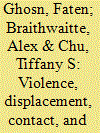|
|
|
Sort Order |
|
|
|
Items / Page
|
|
|
|
|
|
|
| Srl | Item |
| 1 |
ID:
171797


|
|
|
|
|
| Summary/Abstract |
This article argues that dynamics among rivals can affect how host states respond to refugees. Particularly, refugees from rival states can motivate host countries to promote inclusive action because they are exiled from an adversary. By treating refugees well and openly respecting their human rights, host states can, in effect, shame their rival, thereby undermining the adversary's legitimacy and discrediting the opposing government in the eyes of the international community. In the absence of a strategic rivalry, host governments do not have this incentive to support refugee human rights. Using statistical analyses, I find support for these hypotheses. In particular, the arrival of refugees from a neighboring rival state are associated with the strongest increase in respect for human rights within the host country, whereas refugees from a noncontiguous, nonrival state are related to a decrease in respect for human rights.
|
|
|
|
|
|
|
|
|
|
|
|
|
|
|
|
| 2 |
ID:
164559


|
|
|
|
|
| Summary/Abstract |
How do individuals’ personal experiences with various aspects of political violence affect their attitudes toward hosting conflict refugees? More specifically, how do their personal exposure to violence, their own personal experience of being displaced, and their recent contact with refugees influence these attitudes? To explore answers to these questions, we draw upon a recent survey of 2,400 Lebanese residents where we identify individuals who experienced violence during the Lebanese civil war (1975–90), those forced to flee their homes during that conflict, and those who enjoy recent contact with Syrian immigrant and/or displaced populations. We examine whether these distinct experiences affect respondents’ regard for members of the Syrian refugee population. Results demonstrate that historical exposure to violence and experience of displacement have no discernible impact on individual attitudes toward hosting refugees. We find much stronger evidence that attitudes are associated with whether individual respondents have had contact with Syrians in Lebanon; those with such interactions are significantly more likely to support hosting refugees, to consider hiring a refugee, or to allow one of their children to marry a refugee. Our findings suggest exposure to violence by itself does not correlate to positive sentiments toward refugees, especially over time. Further, finding ways to create positive contact between refugees and native populations may be associated with improving attitudes and relations between the two populations.
|
|
|
|
|
|
|
|
|
|
|
|
|
|
|
|
|
|
|
|
|